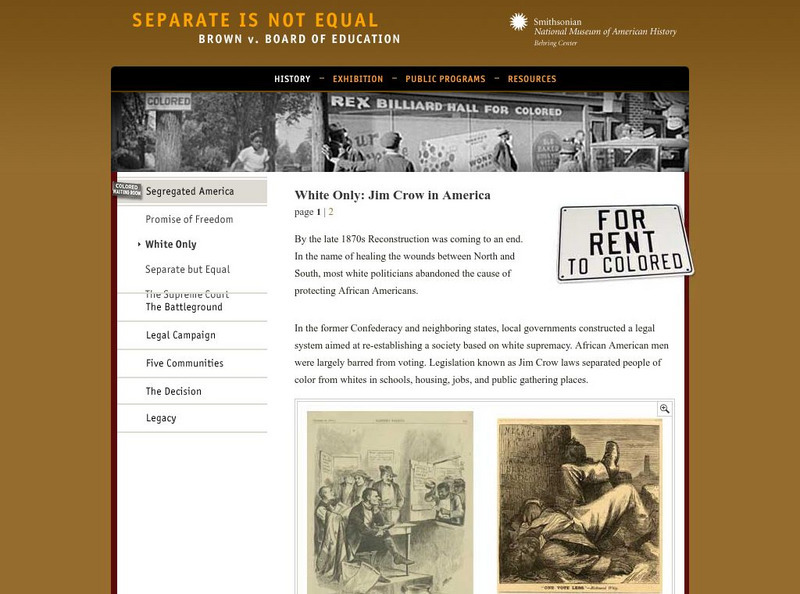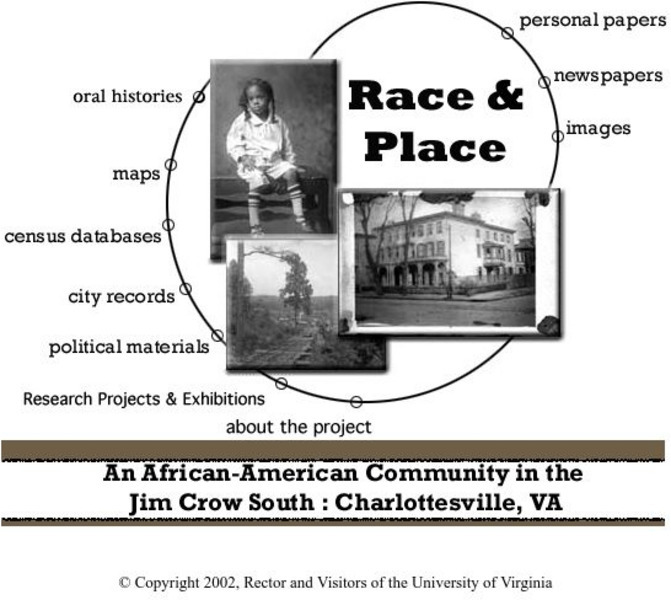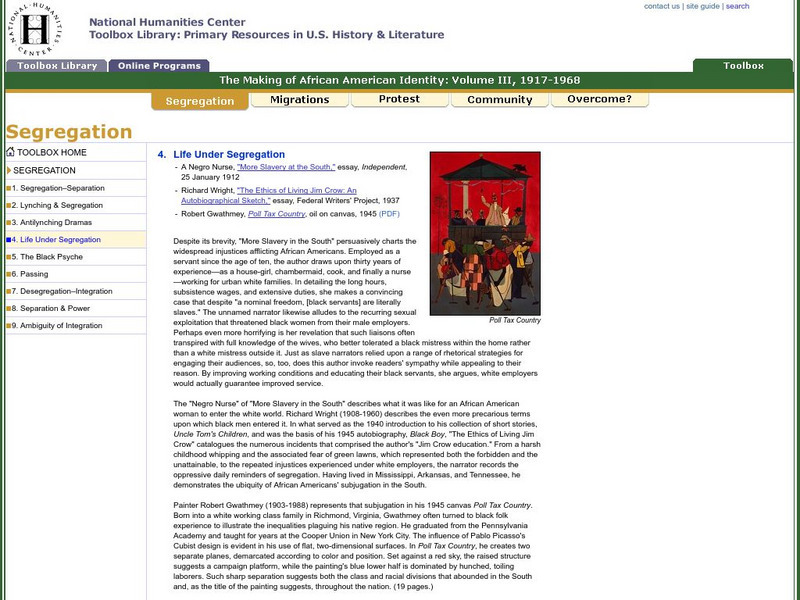PBS
Pbs: L. Hansberry: A Raisin in the Sun: Jim Crow, Home Ownership, American Dream
Learn how Jim Crow laws impacted home ownership and the pursuit of the American Dream in this series of videos from the American Masters film, Lorraine Hansberry: Sighted Eyes/Feeling Heart. Lorraine Hansberry's family was at the...
Smithsonian Institution
National Museum of American History: Separate Is Not Equal: Jim Crow Laws
Find Jim Crow laws, see signs, and read restrictive covenants that restricted freedom of movement, housing, and use of public facilities by African Americans in the late 19th and 20 centuries.
PBS
Pbs: Jazz Is About Collaboration: Jim Crow Laws: Segregation
Engage your students in discussion about segregation and the Jim Crow laws with this in-depth lesson plan. Using jazz music, you will contrast the ways in which America's most significant contribution to the arts depended on...
Other
Jim Crow Museum of Racist Memorabilia: What Was Jim Crow?
A listing of the Jim Crow laws and understood Jim Crow etiquette found across the South in the late 19th century.
PBS
Wnet: Thirteen: The Rise and Fall of Jim Crow
Companion to a four-part PBS series about Jim Crow has a timeline with links to significant events and people, video and audio clips from the series, and in-depth backgrounders on Jim Crow issues and impacts.
Library of Congress
Loc: Civil Rights Jim Crow in America
A collection of primary source materials that reflect the Jim Crow laws in the United States. Includes analysis tools and teacher guides.
Khan Academy
Khan Academy: Ap Us History: 1865 1898: The South After the Civil War: Jim Crow
Explains how Jim Crow laws came to be created in the South and what it meant for African Americans. Discusses the Plessy v. Ferguson Supreme Court case, how its decision was eventually overturned, and the events that brought an end to...
Constitutional Rights Foundation
Constitutional Rights Foundation: A Brief History of Jim Crow
Article provides an overview of the history of Jim Crow laws and questions for discussion.
Siteseen
Siteseen: American Historama: Jim Crow Laws
Learn about the Jim Crow Laws, Southern laws that legalized segregation.
PBS
Wnet: Thirteen: Rise and Fall of Jim Crow: A National Struggle: Congress
This two-page segment of a larger PBS site about Jim Crow discusses the role of Congress over close to 100 years in first entrenching Jim Crow laws in the law of the land, and eventually, through the Civil Rights Act of 1965 and the...
Ducksters
Ducksters: Civil Rights for Kids: Jim Crow Laws
On this site,students learn about the history of Jim Crow Laws including segregation in the South, example laws, grandfather clauses, black codes, and how they got the name Jim Crow.
iCivics
I Civics: Jim Crow
Use primary documents and images to discover the ways state and local governments restricted the newly gained freedoms of African Americans after the Civil War. Compare, contrast, and analyze post-war legislation, court decisions...
Other
Amistad Digital Resource: Jim Crow
This article explores the Jim Crow system of racial exploitation which was a way of regimenting segregation in both political and cultural relations.
Smithsonian Institution
National Museum of American History: Separate Is Not Equal: White Only
This section from the Smithsonian Institution's National Museum of American History's exhibition Separate Is Not Equal: Brown v. Board of Education gives the history of Jim Crow laws and how they affected not only the voting rights of...
Khan Academy
Khan Academy: Us History: 1865 1898: Jim Crow
After Reconstruction, states in the South passed laws that barred African Americans from voting and segregated schools, restaurants, and public accommodations.
The History Cat
The History Cat: The Jim Crow Era: The Life and Death of Jim Crow
Looks at how Southerners continued to discriminate against blacks after the Civil War through Black Codes, or Jim Crow laws, which permitted practices such as segregation in public places and requiring literacy tests in order to vote.
Texas State Library and Archives Commission
Texas State Library and Archives Commission: The 1890s: Jim Crow Laws
In 1891, the Texas Legislature passed the Jim Crow law, which "required separate railroad coaches for African Americans." Learn why this was passed and given the name "Jim Crow."
University of Virginia
Race and Place: An African American Community
"Race and Place" is an archive about the racial segregation laws, or the 'Jim Crow' laws from the late 1880s until the mid-twentieth century. The focus of the collection is the town of Charlottesville in Virginia. The site contains...
Digital History
Digital History: Discrimination in Public Accommodations [Pdf]
Segregation and Jim Crow laws codified a color line in the United States. African-Americans began pushing back against segregation in the 1950s and 1960s. Read about the non-violent actions taken and how these actions resulted in the...
Texas State Library and Archives Commission
Texas State Library and Archives Commission: The 1890s: End of an Era and the Quest for Civil Rights
Part of an online exhibit called "Forever Free," this section deals with African Americans' efforts to establish themselves in society, despite increases in racism. Addresses topics such as Black Codes, Jim Crow Laws, and voting rights.
Khan Academy
Khan Academy: Ap Us History: 1844 1877: Reconstruction: The Compromise of 1877
Discusses the Compromise of 1877 which gave the presidency to Rutherford B. Hayes and signaled the end of Reconstruction in the South. As a result of this act, federal troops withdrew from the South, and Jim Crow laws were passed by...
Khan Academy
Khan Academy: Ap Us History: 1865 1898: The Compromise of 1877
Explains how the Compromise of 1877 settled the contested 1876 presidential election, declaring Rutherford B. Hayes the winner while agreeing to withdraw federal troops from the South. This paved the way for the South to enact Jim Crow...
National Humanities Center
National Humanities Center: Toolbox Library: Life Under Segregation: Making of African American Identity: V. 3
Memoirs and a painting illustrating African American life under segregation. These resources help describe what it was like for an African American man or woman to enter the white world.
Smithsonian Institution
National Museum of American History: Separate but Equal: The Law of the Land
A brief description of the Supreme Court decision, Plessy v Ferguson, in 1896, that solidified the separate but equal rule. Included is the title page of the Supreme Court text of the decision.



















